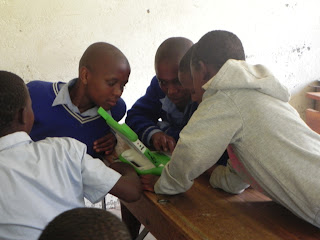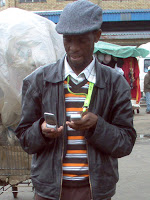 A recent conversation about charging laptops sparked thoughts about how we dealt with this issue. Our solution won’t work for many other projects, like ones that already have
laptops, or projects that get their laptops shipped directly from OLPC or a manufacturer, but it
might be of interest to any future projects like ours that need to ship their own
laptops.
A recent conversation about charging laptops sparked thoughts about how we dealt with this issue. Our solution won’t work for many other projects, like ones that already have
laptops, or projects that get their laptops shipped directly from OLPC or a manufacturer, but it
might be of interest to any future projects like ours that need to ship their own
laptops.
What we did was use wooden shipping crates that later doubled as charging shelves.
Doing it this
way solved several problems for us. It provided sturdy containers that could
withstand international shipping and the rugged mountain trek to the village. It reduced the space needed to transport the laptops (a major concern for us). It drastically reduced our shipping costs. And, it
supplied already-made charging shelves in a location where lumber and tools are hard to come by.
 We took the laptops out of their original cardboard boxes and made our own
customized wooden shipping crates, with 9-10 laptops stacked tightly together and then surrounded by cushioning material. The crates were designed to meet airlines’
checked baggage restrictions for weight (≤50 lbs) and size (≤ 62") and had one removable side for
airport security inspections.
We took the laptops out of their original cardboard boxes and made our own
customized wooden shipping crates, with 9-10 laptops stacked tightly together and then surrounded by cushioning material. The crates were designed to meet airlines’
checked baggage restrictions for weight (≤50 lbs) and size (≤ 62") and had one removable side for
airport security inspections.  At the time, airlines were allowing two free checked bags per passenger. Two project volunteers were able to transport 50 XO laptops, each taking two crates as checked
luggage and extra XO laptops in their carry-on bag. As a result, we ended up having
virtually no excess baggage fees, and our overall shipping costs were minimal.
This saved us hundreds of dollars.
At the time, airlines were allowing two free checked bags per passenger. Two project volunteers were able to transport 50 XO laptops, each taking two crates as checked
luggage and extra XO laptops in their carry-on bag. As a result, we ended up having
virtually no excess baggage fees, and our overall shipping costs were minimal.
This saved us hundreds of dollars.When the laptops reached their destination, we removed one side of each crate and turned the crates into charging shelves. The extra side panels were used to hold the stacked crates together. Power strips were inserted into a compartment on the side of the crates. The XO adapter/power cords were plugged into these, then run along the top of each crate, with a short length of the end hanging loose, just enough to plug into the shelved XOs.
 We also brought extra batteries (seen on the shelves). We swap these out with charged laptop batteries and then charge the extras while in the XO laptops.
We also brought extra batteries (seen on the shelves). We swap these out with charged laptop batteries and then charge the extras while in the XO laptops.- Janissa




